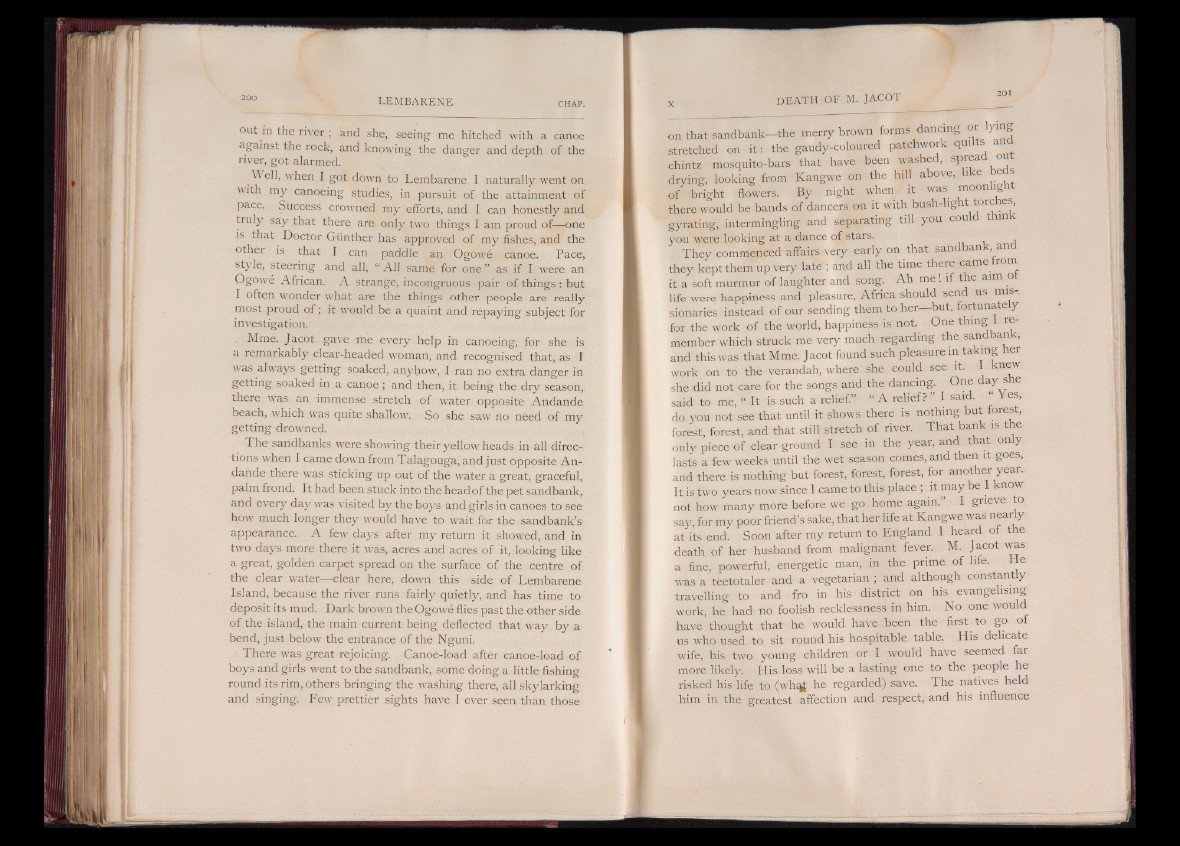
out in the river ; and she, seeing me hitched with a canoe
against the rock, and knowing the danger and depth of the
river, got alarmed.
Well, when I got down to Lembarene I naturally went on
with my canoeing studies, in pursuit of the attainment of
pace. Success crowned my efforts, and I can honestly and
truly say .that there are only two things I am proud of—one
is that Doctor Günther has approved of my fishes, and the
other is that I can paddle an Ogowe canoe. Pace,
style, steering and all, “ All same for one ” as if I were an
Ogowe African. A strange, incongruous pair of things : but
I often wonder what: are the things . other people are really
most proud o f ; it would be a quaint and repaying subject for
investigation.
, Mme. Jacot gave me every help in canoeing, for she is
a remarkably clear-headed woman, and recognised that, as I
was always getting soaked, anyhow, I ran no extra danger in
getting soaked in a canoe; and then, it being the dry season,
there was an immense stretch of water opposite Andande
beach, which was quite shallow. So she saw no need of my
getting drowned.
The sandbanks were showing their yellow heads in all directions
when I came down from Talagouga, and just opposite An-
dande there was sticking up out of the water a great, graceful,
palm frond. It had been stuck into the head of the pet sandbank,
and every day was visited by the boys and girls in canoes to see
how much longer they would have to wait for the sandbank’s,
appearance. A few days after my return it showed, and in
two days more there it was, acres and acres of it, looking like
a great, golden carpet spread on the surface o f the centre of
the clear water;— clear here, down this side of Lembarene
Island, because the river runs fairly quietly, and has time to
deposit its mud. Dark brown the Ogowe flies past the other side
of the island, the main current being deflected that way by a
bend, just below the entrance of the Nguni.
There was great rejoicing. Canoe-load after canoe-load of
boys and girls went to the sandbank, some doing a little fishing
round its rim, others bringing the washing there, all skylarking
and singing. Few prettier sights have I ever seen than those
on that sandbank— the merry brown forms dancing or lying
stretched on it: the gaudy-coloured patchwork quilts and
chintz mosquito-bars that have been washed, spread ou
drying, looking from Kangwe on the hill above, like %
o f bright flowers. By night when it was moonligh
there would be bands of dancers on it with bush-hght torches,
gyrating, intermingling and separating till you could thm
you were looking at a dance of stars.
They commenced affairs very early on that sandbank, an
they kept them up very late ; and all the time there came trom
it a soft murmur of laughter and song. Ah me! if the aim o
life were happiness and pleasure, Africa should send us missionaries
instead of our sending them to her— but, fortunate y
for the work of the world, happiness is not. One thng remember
which struck me very much regarding the sandbank,
and this was that Mme. Jacot found such pleasure m taking her
work on to the verandah, where she could see it. new
she did not care for the songs and the dancing. One ay^s
said to me, “ It is such a relief.” “ A relief?” I said. “ Yes,
do you not see that until it shows there is nothing but iorest,
forest, forest, and that still stretch of river. That bank is the
only piece of clear ground I see in the year, and that only
lasts a few weeks until the wet season comes, and then it goes,
and there is nothing but forest, forest, forest, for another year.
It is two years now since I came to this place ; it may be I know
not how many more before we go home again. I grieve to
say, for my poor friend’s sake, that her life at Kangwe was nearly
at its end. Soon after my return to England I heard of the
death of her husband from malignant fever. M. Jacot was
a fine, powerful, energetic man, in the prime of life. He
was a teetotaler and a vegetarian ; and although constantly
travelling to and fro in his district on his evangelising
work, he had no foolish recklessness in him. No one would
have thought that he would have been the first to go o
us who used to sit round his hospitable table. His delicate
wife, his two young children or I would have seemed far
more likely. His loss will be a lasting one to the people he
risked his life to (wh^ he regarded) save. The natives held
him in the greatest affection and respect, and his influence